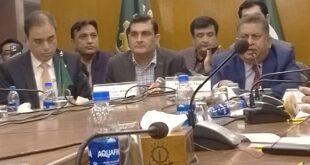special correspondent Sindhsamaachar
ISLAMABAD: The International Monetary Fund (IMF) has sought over Rs430 billion cash surpluses from provinces in the next fiscal year – a demand that the federating units have termed unrealistic and linked any cash surplus with the ability of the federal government to collect more taxes. In a meeting with Pakistani officials at the Q-Block, the IMF mission urged them to throw cash surpluses of around 1% of the Gross Domestic Product (GDP) or over Rs430 billion for the fiscal year 2019-20, FM sources said. The demand has been made to keep the overall budget deficit below 5% of the GDP and project a primary fiscal balance. Adviser to the Prime Minister on Finance Dr. Abdul Hafeez Shaikh, along with Sindh Chief Minister Murad Ali Shah and provincial finance ministers of Punjab, Khyber-Pakhtunkhwa, and Balochistan, held a joint meeting with the IMF mission, led by Ernesto Ramirez Rigo.
The meeting took place in the context of the IMF programme that Pakistan is seeking to lessen pressure on external sector and put the economy on a sustainable path of economic growth –an objective that was common in every 21 programmes that Pakistan signed with the IMF so far. Due to lower expenditures than the total revenues, the four federating units often book surplus cash that in turn is used for calculating the overall budget deficit of provincial and the federal governments. But the provinces found the IMF demand unrealistic and linked the cash surplus with the additional revenues that they will receive from the Centre under the National Finance Commission (NFC) award in the next fiscal year.
As against the IMF’s demand of over Rs430 billion cash surplus, the finance ministry also expects that the four provinces may generate a cash surplus of around Rs275 billion or 0.6% of the GDP. The provinces were inclined to accept the finance ministry’s cash surplus demand but they linked it too with the Federal Board of Revenue’s (FBR) ability to collect more taxes. For this fiscal year, the FBR is expected to collect less than Rs4 trillion in taxes – a figure that the IMF wants to see at around Rs5.4 trillion in the next fiscal. The finance ministry officials believed that due to nearly Rs1.4 trillion additional tax collection, the provincial governments will be in a position to throw cash surpluses. The four federating units get 57.5% of the federal taxes as their share under the NFC. However, the FBR sustained over Rs345 billion shortfall in tax collection during the first 10 months of this fiscal year, which also adversely hit provincial budget allocations.
“What provinces can’t afford is to reduce their provincial budgets from this year’s levels for the sake of generating cash surpluses,” said the K-P Finance Minister Taimur Saleem Jhagra. Jhagra said the cash surpluses must come from the additional tax revenues to be generated by the FBR next year. The provincial governments assured the mission that they would support and complement the efforts of the federal government to adhere to the fiscal framework being discussed with the IMF, according to a handout issued by the finance ministry after the meeting. The main concern for the provinces was to protect their development spending, as low public spending has also hit the economic growth leading to higher unemployment in the provinces. The K-P’s finance minister said his recommendation to the federal government was to engage more with the political leadership of the provinces on all these issues. To a question, he made it clear that there will be no compromise on provincial autonomy. Jhagra said talks with the IMF should conclude soon so that the phase of uncertainty ends and the country may move forward.
https://sindhsamaachar.com/ur/%D8%B3%D9%86%DA%8C-%DB%BE-%D8%A7%D9%8A%DA%8A%D8%B2-%D8%AC%D8%A7-%DA%87%D8%B1%DA%AA%D8%A7%D8%A6%D9%8A%D9%86%D8%AF%DA%99-%D8%A7%D9%86%DA%AA%D8%B4%D8%A7%D9%81%D8%8C-%DA%8A%D8%A7%DA%AA%D9%BD%D8%B1-%D8%A2/
 سنڌسماءَچار
سنڌسماءَچار





